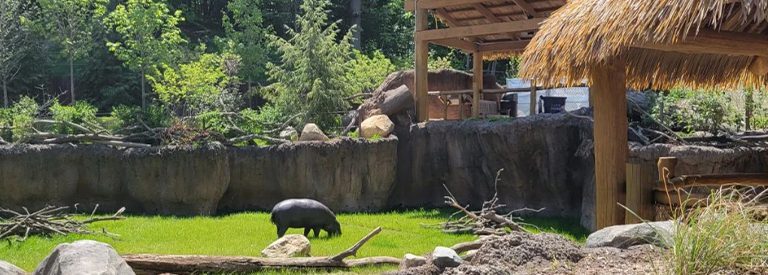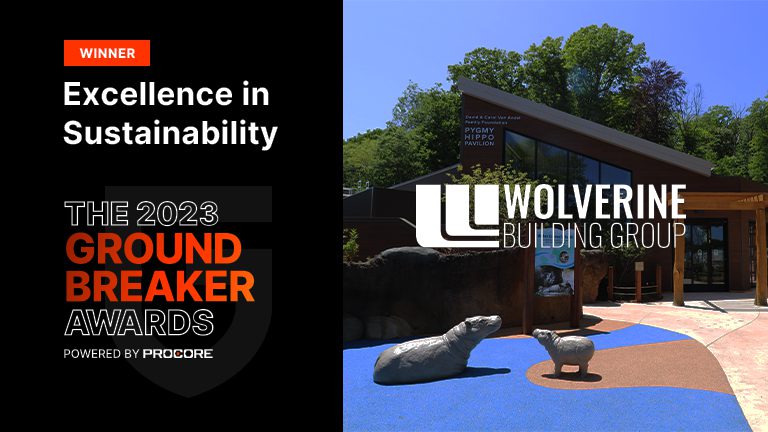Procore set out to find the companies, projects and individuals that stood out for their bold achievements in construction. Among the 27 outstanding finalists selected, nine were named winners of the 2023 Groundbreaker Awards. This article is the first in a nine-part series spotlighting each winner.
Sustainability may be a trending topic in construction, but one organization is really putting in the work. Wolverine Building Group, a commercial contractor headquartered in Grand Rapids, Michigan, lives out its purpose to “Positively Impact People and Communities” on every project. This translates to achieving big goals in sustainability and partnering with like-minded clients to do groundbreaking work that uplifts both the community and the environment.
The Wolverine team includes several project managers with LEED accreditations and, for decades, has delivered many projects that are LEED certified, Enterprise Green certified and SITES Gold. David Paquet, a project manager, is passionate about putting Wolverine’s core values to work on every project, especially those with sustainability at the forefront.“
Our core value of “Do the Right Thing” steers us in any situation, especially when it comes to sustainability because there’s a lot of ways to interpret it — but it’s always in the back of our minds,” Paquet explains. “When a client comes to us, and they have this sustainability challenge, to me, doing the right thing is rolling up our sleeves and trying to solve it.”
Positively impacting the environment and community
In 2023, Wolverine completed the first commercial-use building pursuing the Living Building Challenge Materials Petal — a pygmy hippo habitat at John Ball Zoo. Paquet and his team view sustainability as “leaving the world a better place than the way we found it for future generations,” and this commitment showed up in a significant way on this challenging, unique project.

The pygmy hippo habitat is a continuation of John Ball Zoo’s longtime partnership with Wolverine. During preconstruction, the two organizations worked closely together to decide what sustainability certifications they wanted to pursue, and the Materials Petal of the Living Building Challenge was chosen. This certification carries goals for recycling construction waste and materials, as well as filtration and reuse of non-potable water, 70% energy reduction from an equivalent baseline and several human impact considerations.
It is outlined by five imperatives: Responsible Materials, Red List, Responsible Sourcing, Living Economy Sourcing and Net Positive Waste. In pursuit of this goal, Wolverine led extensive materials sorting and repurposing, resulting in over $50,000 worth of materials reused.
Achieving buy-in both at the client and onsite levels made this project successful. John Ball Zoo was eager to meet the Living Building Challenge head-on with Wolverine. For the team on the jobsite every day, this buy-in came by way of making sustainability personal. To pursue the Materials Petal, Wolverine had to achieve 90% waste diversion — a goal they actually surpassed through careful sorting, reuse and donation of materials. Some team members even found uses for demoed materials, such as a pair of former Zoo ticket booths repurposed into hunting blinds by one employee.
The pygmy hippo exhibit wasn’t without its difficulties. Wolverine had to carefully navigate through three years of preconstruction to plan for the unique challenges of the project. The exhibit’s location on the side of the hill presented its own set of hurdles. Wolverine ended up adding features such as solar panels, deep geothermal wells, a large water filtration system (similar to a water treatment plan), radiant floor heat and more to ensure the exhibit was both perfectly suited for the pygmy hippos as well as the environment.
The project didn’t just result in an optimal habitat for pygmy hippos — it also created an interactive, accessible exhibit for all visitors.
“The exhibit really tells a story with a lot of interpretative and interactive elements as you go through it. It teaches you where pygmy hippos are from, the conservation challenges in those places in Africa and also relating that to the challenges we have in Michigan as well. It focuses on how water connects all of us,” explains Paquet.
Sustainability in action
Wolverine’s sustainability commitment goes beyond just its work at the Zoo. They frequently accomplish work in the affordable housing space, pursuing various LEED certifications. Another area they shine in is historic renovation. One such repurposed building is an over 100 year-old furniture factory being turned into a 382-unit mixed use complex.
“We breathe new life into really old spaces within our historic preservation portfolio,” says Paquet.
Reusing and preserving historic buildings benefits both the community and the environment as it reduces the need for new ground to be broken while also ensuring landmarks aren’t destroyed.
When it comes to sustainability, Wolverine focuses on actually doing what they say they will. Paquet advises other construction companies starting their sustainability journey to aim for client buy-in and if that’s not possible up-front, to dig deeper and show lifecycle value from building sustainably.
At Wolverine, every day is a chance to build better and make a positive impact as they aim for sustainable construction.

Leave a Reply